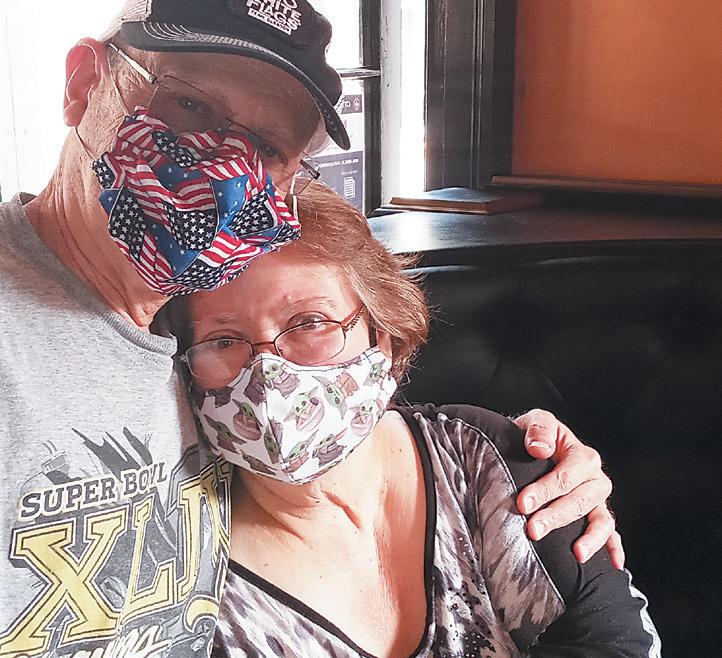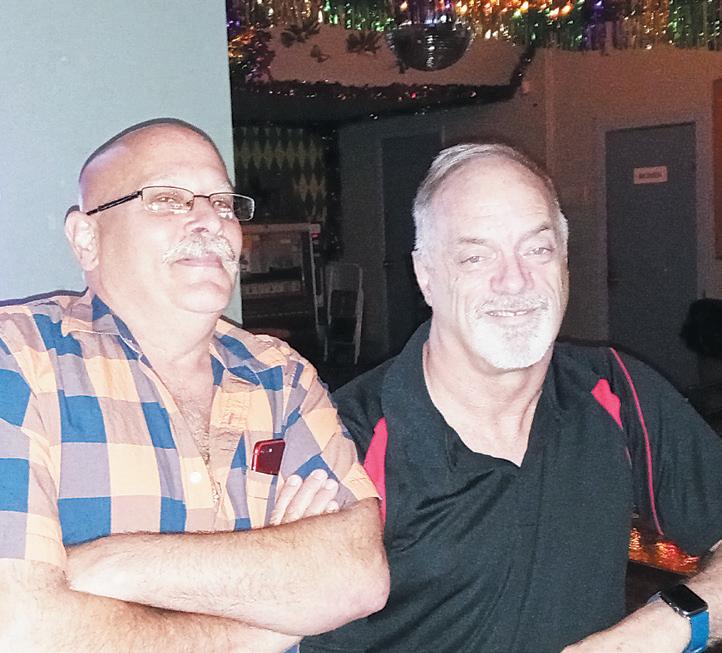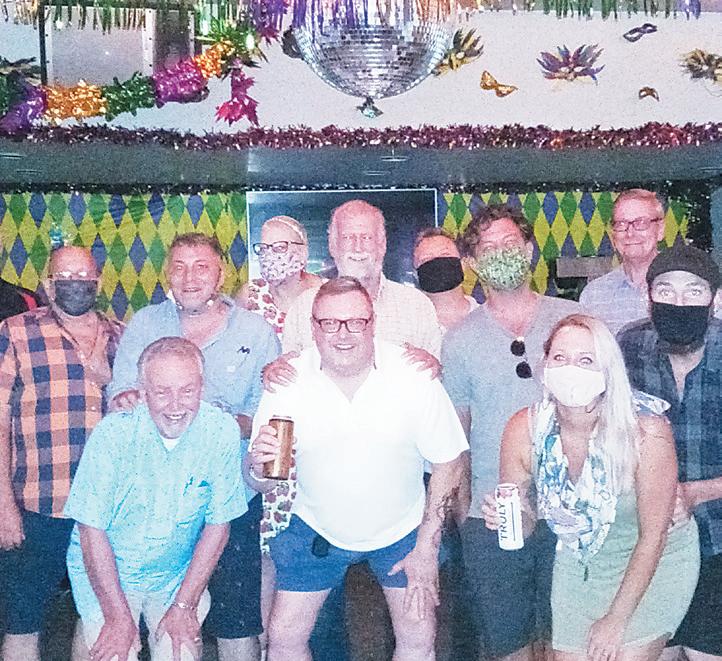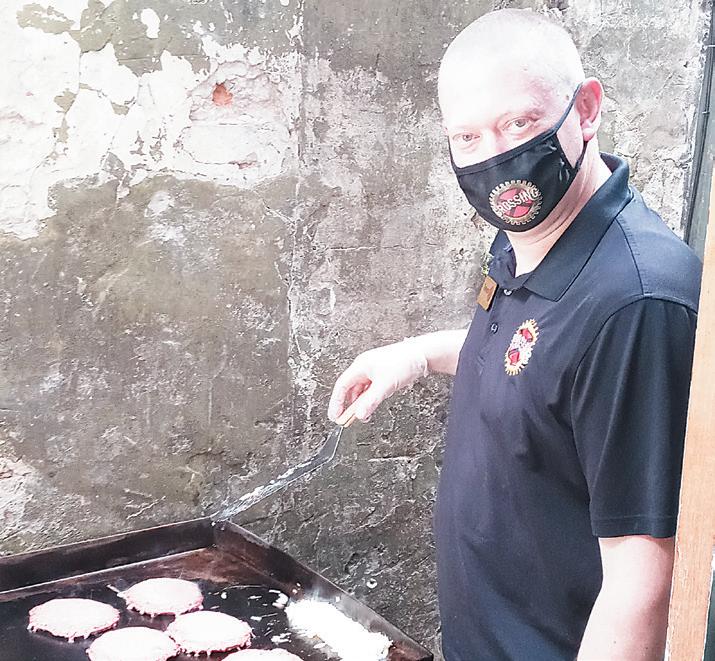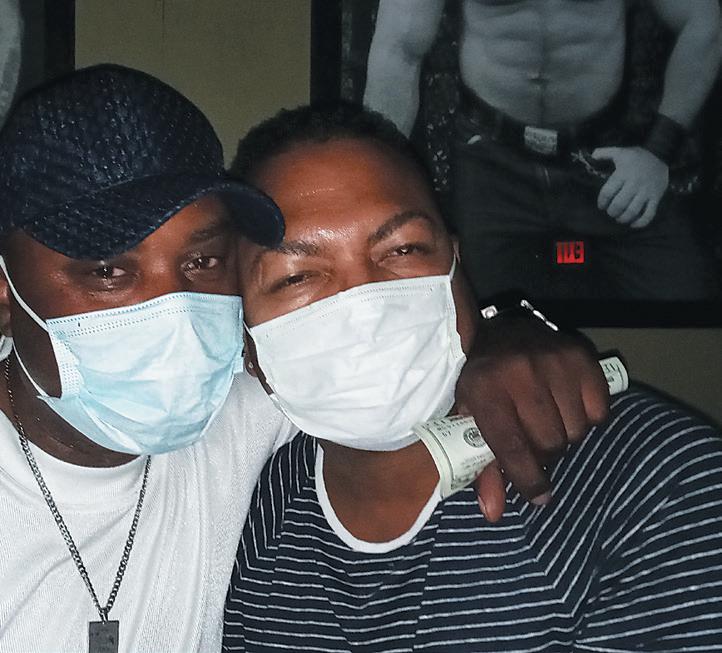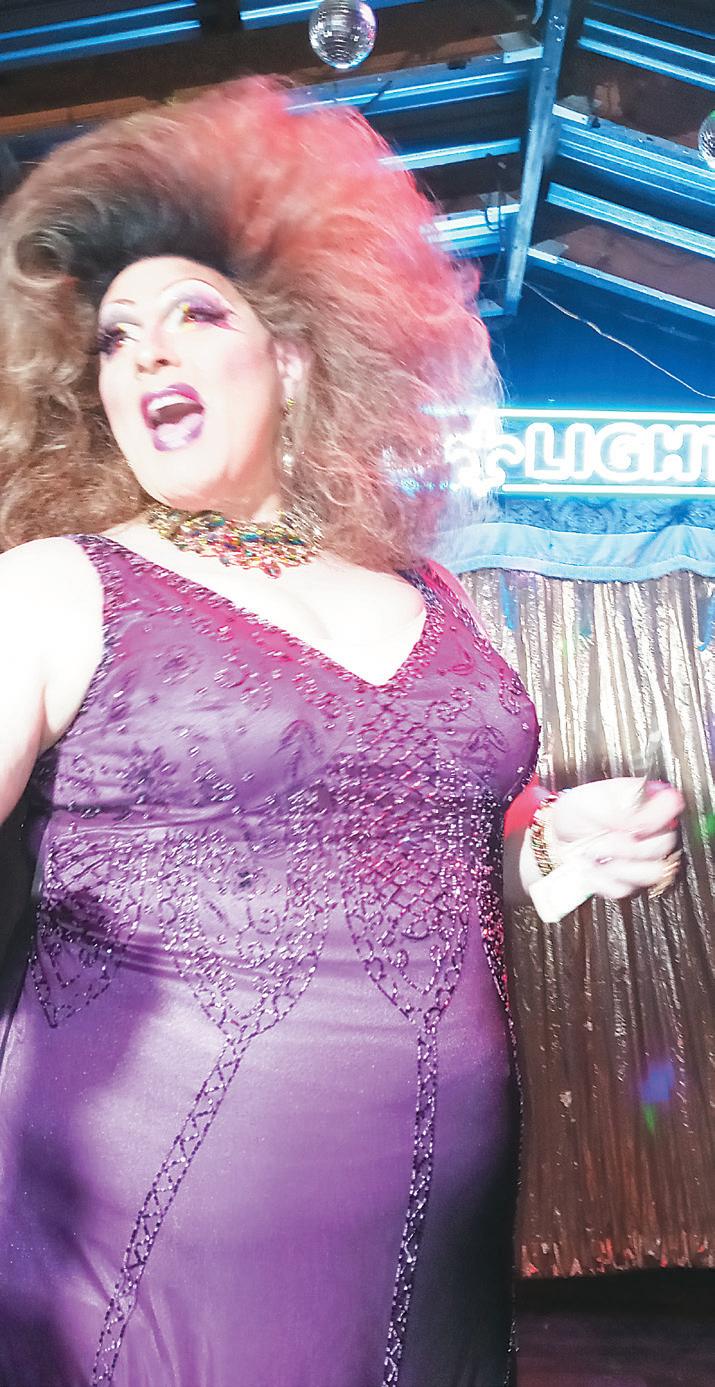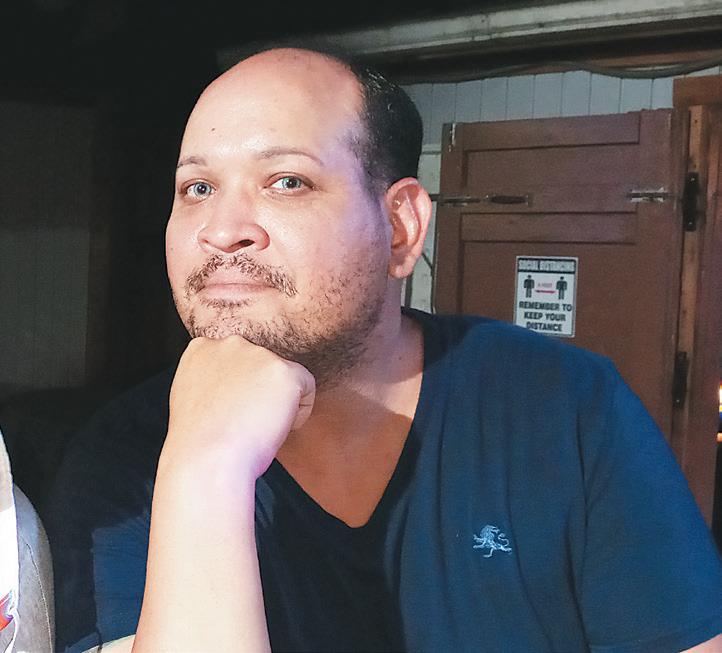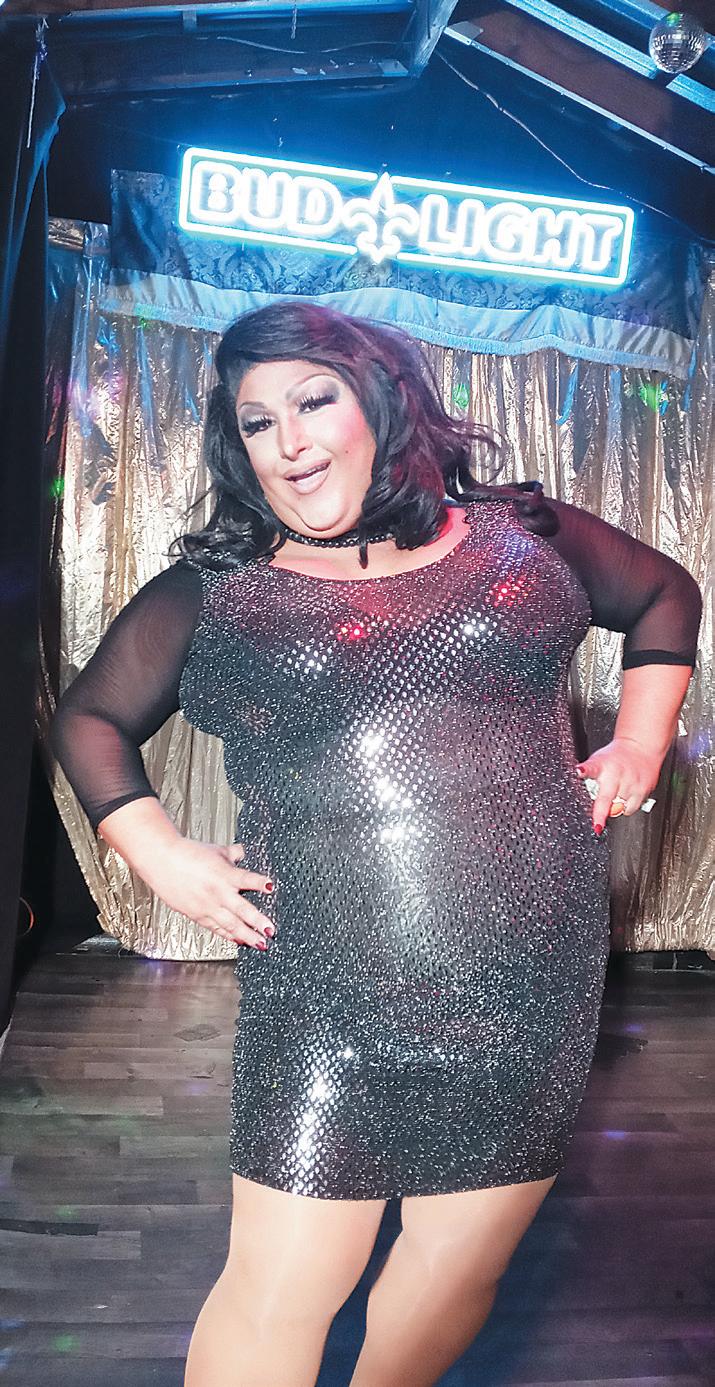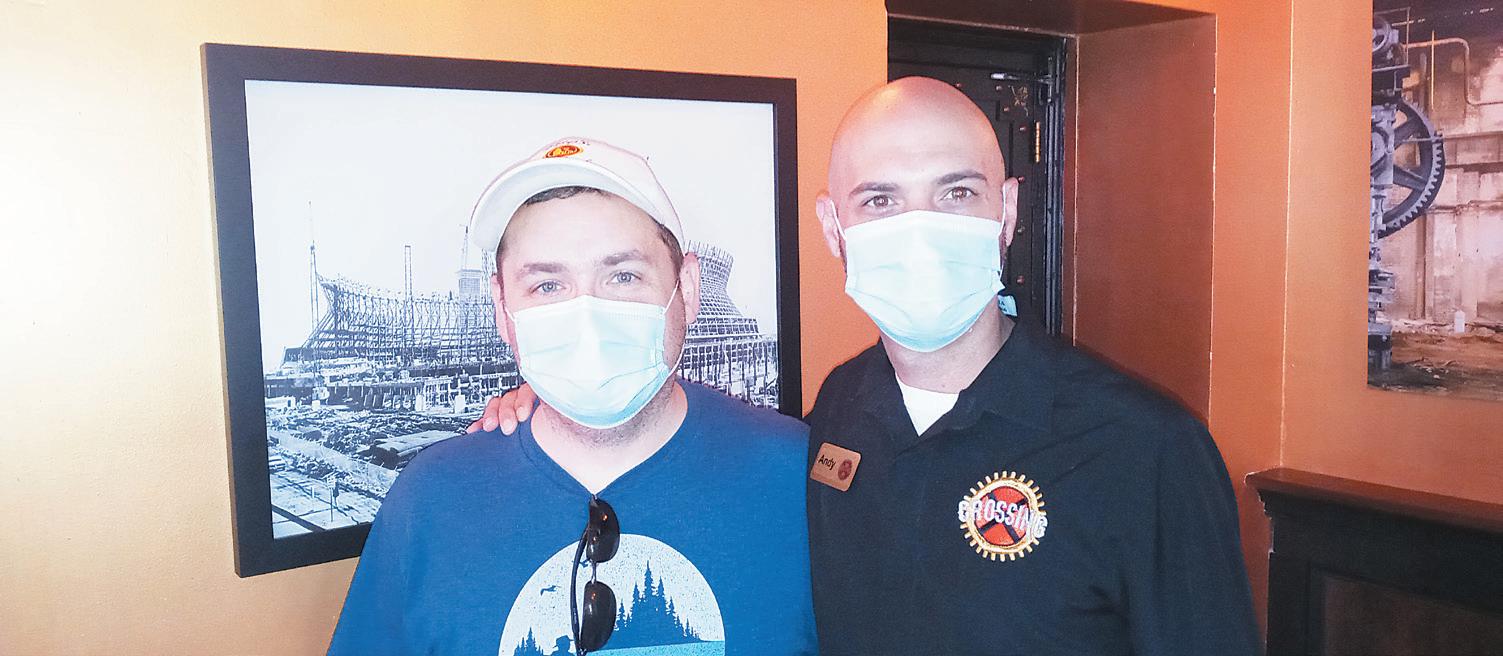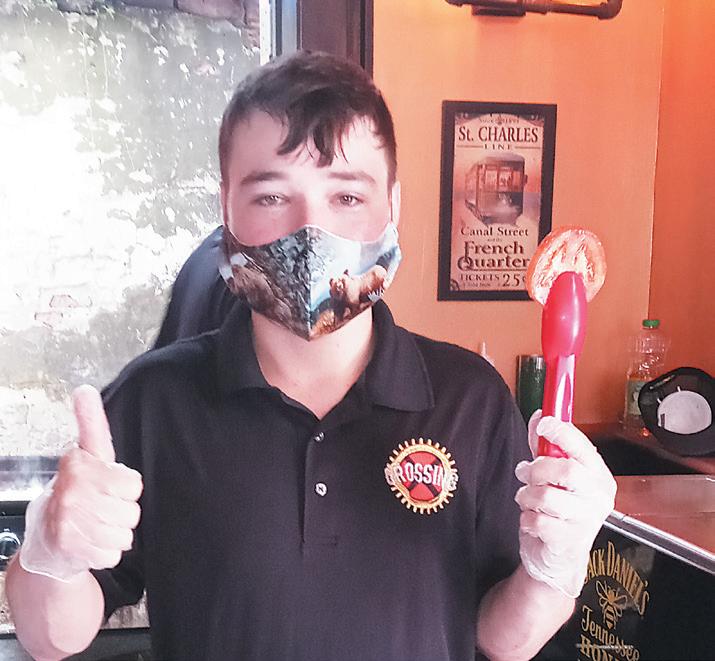
44 minute read
Arts & Culture
ARTS & CULTURE Trodding the Boards
Brian Sands bsnola2@hotmail.com
Curtain Up, Computer On
The Company: A St. Bernard
Community Theatre presents Flowing Robes, a play that examines the lives of women as the British attempt to invade New Orleans and how they are changed as a result of that. Performances will be at The Azienda Theatre (2000 Paris Rd., Chalmette) July 29 thru August 1.
Producer Mark Cortale and Host/ Musical Director Seth Rudetsky have added Norm Lewis (July 19), Megan Hilty (July 26), and Cheyenne Jackson (August 2) to the line-up of The Seth Concert Series, the fabulous virtual cabaret/interview series similar to Broadway@NOCCA. Each show premieres on Sunday night at 7pm (CDT) with a second showing the next day at 3pm (CDT). Tickets are available at www.thesethconcertseries.com.
PAST PRESENT FUTURE IV
For the fourth PAST PRESENT FUTURE, Anthony Bean lets us know
what was going on at the Anthony Bean Community Theater and Acting School (ABCT) when things shut down, what it’s doing now, and what plans he has for its future.
Over 8 years, ABCT was nominated for 62 Ambie Awards, winning 14; Bean won Best Director in 2004 for King Hedley II which also won Best Drama. Reviewing that August Wilson play I wrote “Bean coaxed beautiful performances from his ensemble with fl uid, unobtrusive direction. His production hurtles along yet properly slows down when characters address the audience with mesmerizing monologues.”
Of The Sty of the Blind Pig, which also won the Ambie for Best Drama, I said in 2007 “With his extraordinary cast, director Anthony Bean avoided the play’s excesses and found a rhythmic beauty in its little daily rituals.”
After losing its home of 17 years on Carrollton Avenue, ABCT has been operating out of the campus of Southern
NEW TO MARKET.
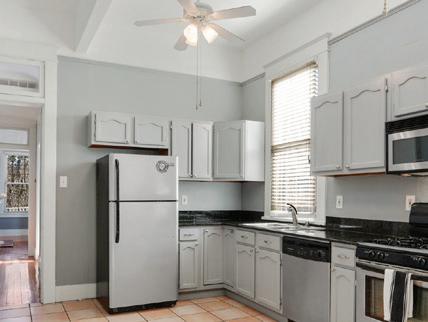

1716 JOSEPHINE STREET #B | $239,900
Only steps to St. Charles Avenue in the Lower Garden District. Thhis second story condo features tons of New Orleans charm and character - tall ceilings, a lovely balcony with views of St. Charles, a back patio, onsite storage, tall ceilings, hardwood floors, transoms, and an in-unit washer and dryer. The condo includes 2 bedrooms, 1 bath with approximately 1100 SF.
Learn more about this property online at nolastyles.com
Michael Styles • Engel & Völkers New Orleans
722 Martin Behrman Avenue • Metairie, LA 70005 4826 Magazine Street • New Orleans, LA 70115 +1 504-777-1773 • +1 504-875-3555 michael@nolastyles.com

Anthony Bean with students of last year’s ABCT/NORDC Performing Arts Youth Summer Camp

University at New Orleans for the last three years as the company prepares to relocate this Fall to its own space in the Gentilly area.
PAST
It was a Wednesday, February 26, the day after Mardi Gras in New Orleans. We all agreed that we have to work fast after Mardi Gras to make this August Wilson Theater Festival a signifi cant success.
The Anthony Bean Community Theater (ABCT) and the Center for
African and African American Stud
ies at Southern University at New Orleans (SUNO) would be hosting the event. Everything is going as planned. We just got a grant from the New Orleans Jazz and Heritage Festival, and we are booking fl ights for our intended guests. We have artistic directors of theaters coming from around the country to help us celebrate the legendary August Wilson, my hero.
Elise Felix, my assistant, got the news that there is a virus in Wuhan, China, and it has reached the States. And people are dying. Someone suggested that I should watch the news and be prepared to move this event to the summer months. I immediately said “No.” We needed to have this festival in April. August Wilson was born on April 27, and there will be a national celebration. We will be the fi rst announced festival that will celebrate this man. So, it must be in April.
That Monday, March 2, I received the most devastating news. I didn’t think it could get any worse. An executive from the August Wilson Estate called to inform me that we could not use the August Wilson name for this event. I was confused; I had been communicating with his Estate for the last two months, they were excited that I was having this event and, now, they want to tell me that I can’t use the name.
Naturally, I asked why and was told that there would be signifi cant events, including a festival, in his hometown, Pittsburgh, and the Estate has granted his home city exclusive use of Wilson’s name for this period. I was crushed. Why can’t we both do it together? After all, I’m in New Orleans, far from Pittsburgh. They wish me luck and hang up. I immediately called an emergency committee meeting to tell the Board this awful news.
So much was planned for this 4-day event. The recipient of The August Wilson Award was going to be renowned actor Samuel L. Jackson, who assured us that he would be here to accept the award. Theater groups from all over the country would present one-act plays. ABCT actors would perform Fences. High School students would participate in the August Wilson Monologue Competition.
The schedule also included an ABCT Benefi t Gala, where we would honor our prominent donors as well as Oliver Thomas, Irma Thomas, Sally-Ann Roberts, Adella Gautier, and Terry Jones. It would be the fi rst of its kind in the Southern region, and now, you are telling me that I can’t use the festival’s namesake to bring attention to not only August Wilson’s legacy but to this New Orleans community theater, one of the few in the entire country that has performed all ten plays of Wilson’s “Century Cycle”.
The August Wilson Festival Committee didn’t see the world tumbling down as I saw it. Gail Glapion, the Board’s President, stated we had come too far to give up. How about staying on course but change the name? They all agreed, which gave me a sigh of relief.
So, we came up with The First
Annual Black Theater Conference
and Festival. I liked the idea of inclusiveness with the other black theaters in Louisiana. Now, we have to find out who is still with us, now that we can’t name the festival after Wilson. After many phone calls, a few artists/celebrities, all of a sudden, had something else to do, and I can understand it. However, overall, everyone was still excited, especially the few black theaters we have throughout Louisiana. All we had to do now was to create panels and find moderators for them so we could discuss the vital minds in the African American southern theater community.
We called a press conference/ luncheon at the renowned restaurant Dooky Chase’s on March 12 at noon. All of the prominent honorees would be there. How exciting to have Irma, Sally-Ann, Terry, Oliver, and Adella under the same roof.
I thought about my dear friend, actress extraordinaire, and award-winning storyteller, Adella Gautier. I called Elise to make sure Sally and Irma would receive a dozen red roses at the Gala Benefit. Still, I wanted Adella to have two dozens lavender roses, her favorite color. Elise never asked why. She knew I wanted Adella’s night to be extraordinary. The last time I saw her, Adella was in the hospital. She’s been battling multiple myeloma, a bone cancer disease, but to quote her, she is a “cancer thriver”. The lady’s got a zest for life—the energy of a lion protecting her cubs. I have never seen her depressed about her condition nor soliciting sympathy from anyone. She’s a warrior to the highest degree. But still, I don’t want to see someone I love and care about going through pain, even if it is the natural order of things. So April 17 couldn’t come soon enough.
Elise reminded me of the ABCT/ NORDC Performing Arts Youth Summer Camp. NORDC had been calling about this year’s program. They wanted to know how many kids we were accepting and how many workers I was planning on hiring. We have been in partnership with NORDC since the beginning of ABCT, 20 years ago. We let all NORD kids come in at a third of the price, and the City pays the balance for each child.
Now, I’m cursing myself. I completely forgot about the summer camp. But Elise had already spoken to NORDC and confirmed we would receive 80 kids from them, including teens and ten workers. Overall, we would have at least 200 youth this summer. I gave Elise a big hug. She knows how to make my day.
I then got the good news that New Orleans Mayor LaToya Cantrell had agreed to introduce the honorees at the Gala; she assured me she would stay for the whole evening “providing an emergency doesn’t come up.” Boy, what a lift in spirit. We now have the Mayor on board. What could go wrong?
On March 11, a day before our press conference, everybody on our committee, including me, is glued to their TV sets. The World Health Organization announced COVID-19 as a global health crisis. It is officially a pandemic.
I couldn’t comprehend this. A pandemic? Suddenly, my whole vision of a festival and conference came crashing to earth. Suddenly, America had come to a standstill. People were afraid to fly, and the airlines shut down. Schools and universities closed. The local and federal government came to a halt. On the same day, our Mayor and other City officials announced the cancellation of weekend parades, such as St. Joseph’s Day for the Indians and St. Patrick’s Day parades, as a precaution. On March 23, Gov. Edwards enacted a statewide stay-at-home order to encourage social distancing, and President Trump issued a major disaster declaration.
Just when I thought nothing wrong could happen, it did. The world was under attack from an invisible enemy.
PRESENT
Two months later, and COVID-19 is making people sick all over the world. The death toll in Louisiana is in the thousands, and there isn’t any cure in sight. People have been sheltered in place for too long, and they desperately want to get back to their regular routines. My regular ABCT Kids are calling quite often. They want the camp as much as I did.
Elise has been setting up regular staff meetings using Zoom. I had been unfamiliar with this American-based company, but was impressed with its reliable outlet for video and audio conferencing, chat, and webinar. I wanted to learn more about Zoom.
One day I was on Facebook when I saw a video post of gospel singer Kirk Franklin’s new rendition of his old hit, Smile. He had several artists performing with him, and they were all in their houses singing in harmony using Zoom.
That’s when it hit me. I could still have my kids’ summer camp, and we can have it using Zoom. I told Elise, and she agreed. She did her research and came back with good news. We can accommodate up to a hundred kids and even put them in break-out rooms when they need to do scenes. Each teacher will have their place, and I can Zoom in and out of each room I want to monitor. I loved it--that’s what
Will Williams and Gwendolyn Foxworth in Fences
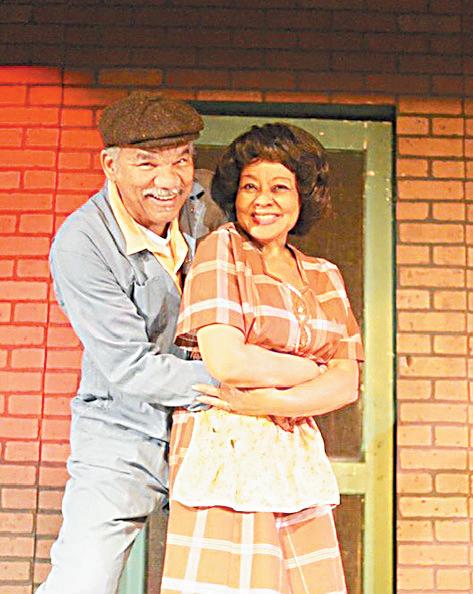
we’ll do. We announced that ABCT would be having a Performing Arts Summer Camp this summer, and it will be virtual.
The response we got from parents was immediate; a lot of the kids had to return their laptops to the schools at the end of the school year. Also, some parents were out of work and could barely keep food on the table.
I had to move quickly. I had been able to raise money to pay my staff, which was a few thousand dollars, but
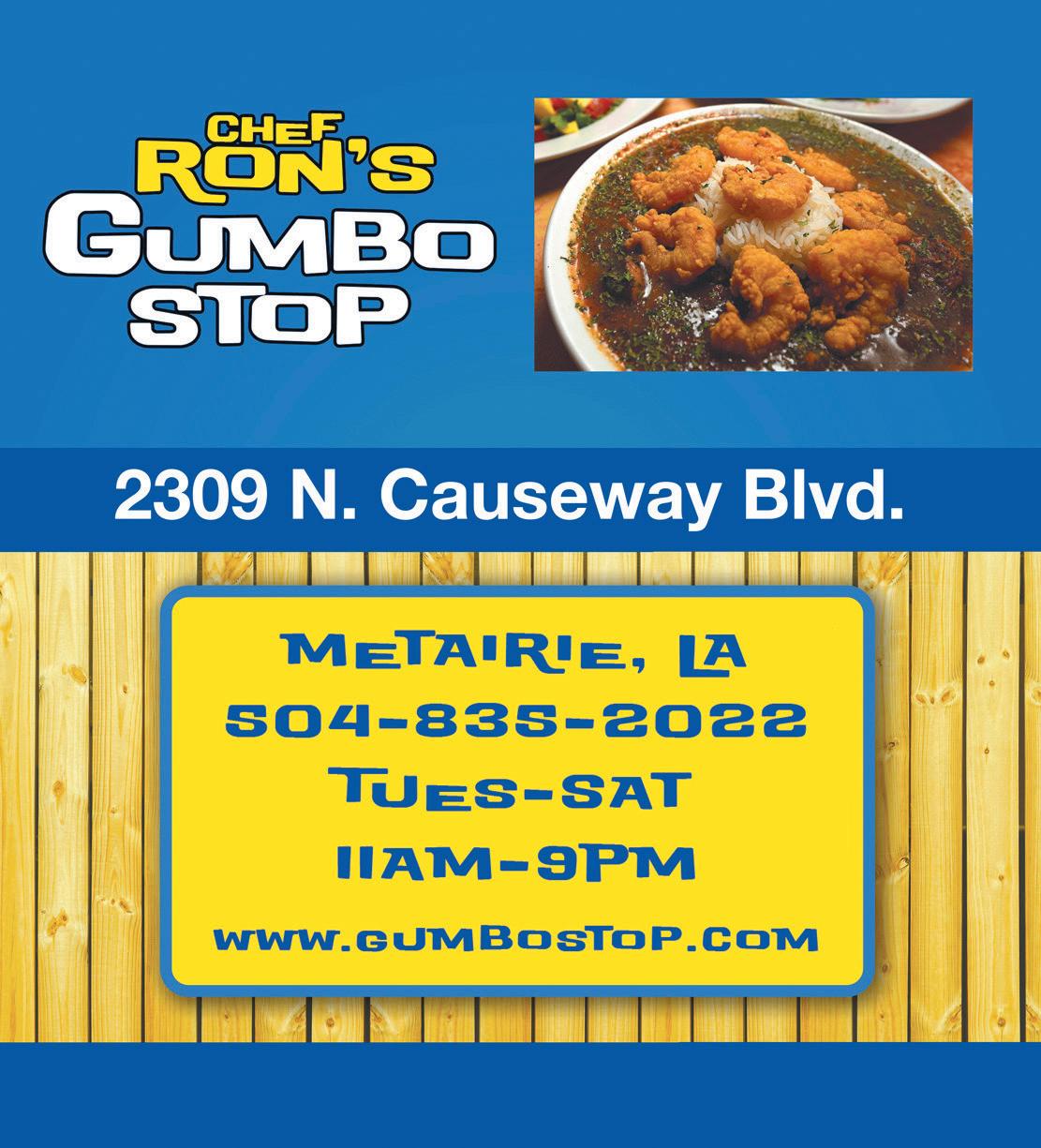
this would be the first time since we began that we are not in partnership with NORDC. So we send out an email stating:
To my ABCT Summer Camp Families:
We understand that due to COVID-19, some families may be experiencing unforeseen hardships. Therefore, any parents of our regular, longstanding, ABCT kids who may be
CONTINUED ON PAGE 9
THE ROCKFORD FILES Next to Normal
Ryan Rockford RyanRockfordNYC@gmail.com
Can we expect life, as we knew it, to resume after the pandemic? I don’t think so. Will things return to the way they were? No. Things will never get back to ‘normal’. The best we can hope for is something next to ‘normal’. But what does that look like?
As a nation, we’ve spent the better part of the last four months doing our very best just to get through COVID-19. In what seemed like an instant, our lives were endangered, many became unemployed unexpectedly and our freedoms restricted by a mandatory quarantine. Our efforts in recent weeks have been focused, and rightfully so, on survival. And, to be clear, the threat of COVID-19 is not over. As many states around the country begin to gingerly re-open in coordinated phases, many businesses and companies are fi nding themselves in danger of being deemed unnecessary.
What began as a study of how millennials are choosing to spend their money, in conjunction with the consequences of the COVID-19 pandemic has put a big bullseye on backs of certain businesses. The sudden lack of discretionary income, social distancing mandates and the mandatory closing of shopping, eating and drinking establishments, has painted a bleak picture for these otherwise grounded establishments.
As expected, the millennial generation is the largest generation to date, so how they think, and what they choose to spend their money on is a concern for big businesses. The longterm survival of any business relying solely on the belief systems or spending habits of the over-40 population becomes questionable.
For example, millennials are not buying fabric softener, and they aren’t ironing much either. Technology has come a long way in the creation of man-made fabrics; the selection of natural fabrics and fabric-blends is now
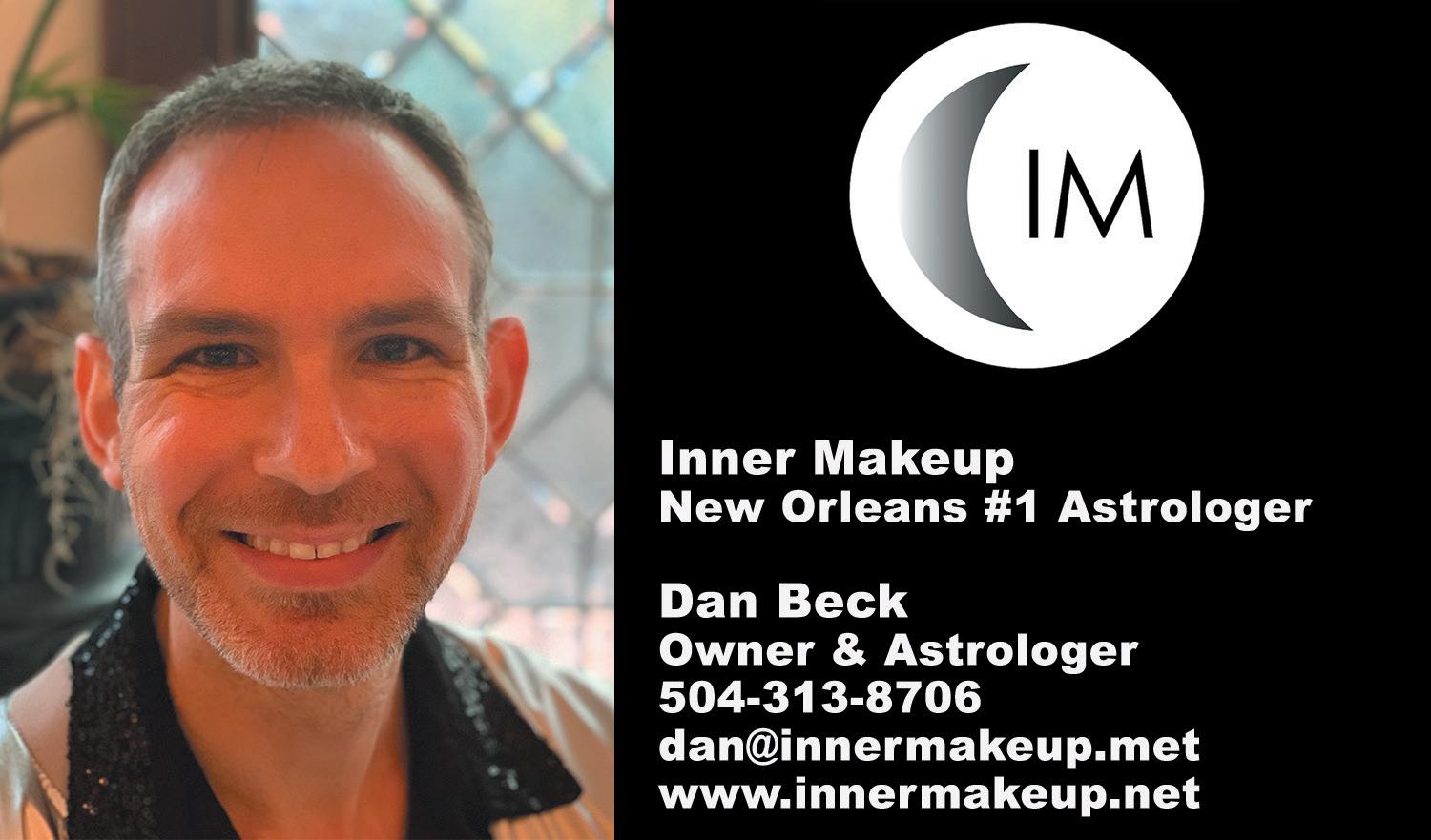
such that contemporary clothes aren’t in need of a softener or iron as much as they were forty years ago. Specifi - cally, the brand Downy, has noticed the sales slump and is having to reimagine and revamp their marketing efforts if they want to stay in the wash of the millennial wardrobe (I know…groan).
Downy isn’t the only brand or industry not feeling the love of millennials. De Beers is also losing a bit of its shine. Apparently, fewer millennials are choosing to get married. No engagements equals no engagement rings. Diamond retailers like De Beers are noticing a drop in diamond sales, with millennials choosing to buy either smaller stones or willing to settle for semi-precious, cheaper, or artifi cial alternatives.
Tailgate parties are starting to take on a different look as well. That pickup truck chock full of ice chests containing Bud Light and Milwaukee’s Best has given way to a Prius with a few six packs of local craft beer in the trunk Apparently, millennials are ditching the national brands in favor of a more curated and local beer-tasting experience What else is falling out of favor for the up’n’coming rulers of the free world? Bars of soap, cars, breakfast cereal and Newman’s Own pasta sauce. The millennials have spoken and currently prefer body wash to bars of Dial or Ivory; prefer breakfast bars to the messy cleanup of breakfast cereals; are choosing ride-share options vs. having the added expense of a car; and although there is nothing wrong with Paul Newman’s Own sauces, the primary question responsible for the brand’s drop in revenue among millennials is, “Who the f^ck is Paul Newman?”
While the spending habits and preferences of a new generation are signifi cant, they aren’t, on their own, world-changing. Adding a pandemic’s social consequences ON TOP of these new spending patterns, however, and preferences can certainly impact life as we know it, or more accurately, as we knew it.
Consider the rather mundane act of going to the movies. Studies show that millennials are skipping the high price of movie tickets and concessions in favor of staying home. Netfl ix, Amazon, Disney+ and other streaming services are offering comparative quality entertainment at a fraction of the price. Add to that the impact of a mandatory closing of movie theaters due to COVID-19 and it isn’t that far of a reach to believe the days of movie theater complexes are numbered. From the industry’s perspective, the number of millennials who don’t want to go to the movies plus the number of people who’ve gotten used to not going to the movies & utilizing at-home movie feeds, equals a signifi - cant portion of the population perfectly content to save their $16 per ticket and kick back in the Barcalounger.
The same phenomenon can be said of department stores and shopping malls. Thanks to COVID-19, it’s not only the millennials who’ve grown to appreciate the panacea of online shopping options. Why battle the parking lots, crowded aisles and checkout lines when you can purchase the same goods, usually at a cheaper price, online, delivered to your door?
As a result, those who weren’t aware of the convenience or plethora of online shopping options available to them before the pandemic, are almost certainly aware of them now. Humans are largely creatures of habit. Now that so many of us have gotten into the habit of clicking our way through our snack list at home in the comfort of our jammies, retailers will have an uphill battle if they hope to maintain, much less increase, the foot traffi c grocery stores, department stores and malls were accustomed to. [Sidebar: When the COVID-19 crisis began in February, my mother jumped on the bandwagon and ordered a pallet-full of toilet paper and paper towels online. The shipment arrived in Louisiana 4 days ago. Yes, online shopping is convenient; never said it was fast.]
Casual dining is also taking a hit. Ironically, it’s the restaurants themselves and not their menu selections that are nearing the chopping block. Millennials are choosing to eat in more than previous generations and the rest of us haven’t been allowed to dine out, even if we wanted to.
Even though some states are entering Phase 3 of the COVID-19 re-opening process, which allows restaurants to re-open with limitations, four months of not waiting for a table, sub-par service and over-priced cocktails, has been easy to get used to. Especially with services like HelloFresh, Home Chef and Blue Apron which deliver health conscious and easy-to-prepare meals to your doorstep without the added costs of gassing up the car, babysitter, and server & valet gratuities.
While we’re on the topic of making health conscious choices, your local gym franchise isn’t immune to becoming extinct either. Millennials are perhaps more health conscious than any generation before, but tend to be opting out of the big chain gymnasiums like Crunch or Gold’s for smaller, boutique fi tness establishments geared toward their exercise regimen of choice like Soul Cycle or Pilates.
In New York, gyms are included in Phase 4 and it may be some time before any of us are back in the swing of a fi tness program. For me, that time cannot come soon enough. I’m one of those people who need to leave the house in order to work out. The athome gym or Bowfl ex bullshit doesn’t work for me. I’ve tried. With each purchase of home exercise equipment, instead of losing weight, I’ve ended up gaining an expensive coat rack, dumbbell doorstops and a very heavy & elaborate drying station for wet towels.
The coronavirus has dug a hole in civilization, upheaving society, slowly, steadily and surely. We’re in deep, people. And we haven’t even begun to shovel our way out, if we can. Without putting too fi ne a point on it, we’re fcked. I hope you have some lube on hand because ‘Rona is just warming up.
Since ‘The Holocough’ burst upon the scene, the service sector cannot provide proper service; large-scale sports and tournaments have been cancelled; national and international travel is being avoided; religious, cultural and festive events have been disrupted; unanticipated stress has infi ltrated the population; we’ve had to socially distance ourselves from friends, family and loved ones; hotels , restaurants and houses of worship have been closed, along with cinemas, Broadway theaters, sports clubs, gymnasiums, swimming pools; some medical treatments, mostly electoral procedures, and examinations have been suspended. The list goes on.
Yes, the world may slowly be beginning to start back up again in some places, but at what cost? Only time will tell but the world as we knew it is gone. I’m curious to see how civilization adapts and adjusts to a new way of being.
We have the unique chance to learn from our past mistakes and create a new reality. Life is about choices. If we choose to create a better, more equal and less biased community, maybe, just maybe, we can emerge from the abyss better than before.
If you have any thoughts, comments or suggestions for future articles, please drop me a line at RyanRockfordNYC@gmail.com.
Until next time.
BOOK REVIEW Compulsive Haiku
Tony Leggio ledgemgp@gmail.com
In my long list of reviews, I do not believe I have done one on a book of haikus. There is a first for everything and my book of the month is called Compulsive Haiku by Rocco Talarico. A haiku is a specific type of Japanese poem which has 17 syllables divided into three lines of 5, 7, and 5 syllables. Haikus are typically written on the subject of nature and is derived from the Japanese word hokku meaning “starting verse.”
Compulsive Haiku is a collection
CONTINUED FROM PAGE 7
experiencing difficulty during this time, please write to us at summercamp@ anthonybeantheater.com and explain fees will be waived. We will not deprive ABCT kids of their usual summer experience here at ABCT. We are more than a theater. We are a culture. We you.
Sincerely,
Anthony Bean
Founder/ Director
Well, we solved the money problems parents may have, but with this short notice there’s nothing we can do about a child not having access to a computer, or if they have a phone but no Wi-Fi connection.
Fifty-two kids show up, however, instead of our normal 150-250. And I must say the kids have been very attentive. It’s a challenge to use the internet for a temporary camp, but you must make do. The young actors are collaborating with other artists, learning about performance, and making lasting memories – all from home.
As I go from room to room on Zoom, I can’t help but grin to myself. Who said that you can’t teach an old dog new tricks? As the campers see that I’ve signed on to greet them, I can hear them shout “Mr. Bean is in!” as they all sit at attention. What a life!
This year’s production will be a 45-minute show the kids wrote themselves called ABCT KIDS TikTok House, about kids coping with COVID-19 while sheltering-in-place. The young characters in it will communicate with each other through the internet. Although they can’t reach out and touch each other, their emotions and frustration seep through as they relate their stories.
One child, whose mother is in the hospital with COVID-19, is left alone to deal with an abusive father. Another is coping with a nagging grandmother who’s addicted to drugs. A third child of 500 titillating and sensitive haiku. He describes it as a light look at the dark side of pleasure, indulgence, obsession and sex. This books pulls no punches especially when entering the realm of sex. Rocco describes the longing, hunger and urgency of gay sex in a frank and yet poignant way. He has separated the chapters according to subject matter such as Vodka and Whiskey or more lustier sections like Maybe, Rules, Friends and Amigos.
Originally from Portland, Maine, has to live with her father after her mother has contracted COVID-19, and the stepmother sprays down the room every time she enters or exits; this child is not happy. They all feel hopeless about their conditions and want out. The theme is “Where Do You Go When All Hope Is Gone?” and each child will define the answer to the others.
Starting Friday, July 24, at 6:00pm, ABCT KIDS Tiktok House will be streamed online at the Anthony Bean Community Theater website. www.anthonybeantheater.com
FUTURE
While I’m experimenting with the Zoom platform, I’m also in rehearsal for August Wilson’s Pulitzer and Tony Award-winning drama, Fences, which will be part of our tribute to August Wilson in two months, hence “August in September”.
The show had been ready to go for the theater festival. I spoke with Gwendolyn Foxworth, Will Williams and the rest of the cast, and they are still prepared. Williams, Foxworth, Harold X. Evans, Alfred Aubry, and DC Paul are reprising roles they performed at ABCT in 2015. [Ed. note: Williams won the 2006 Ambie Award for Best Actor in a Play for an earlier ABCT production.]
Set in 1957, Fences is a bittersweet, moving drama that’s filled with compassion. The underlying themes are about family, responsibility, love, friendship, and respect. In it, Wilson challenges the “American Dream” through a poetic, powerful, and deeply personal story that will especially resonate now.
Fences will begin streaming online on the Anthony Bean Theater website, www.anthonybeantheater.com, beginning on Friday, September 11, at 8:00pm.
Being virtual will be different from seeing a live play. And, if by chance, the virus prevents us from coming together, then I’ll do what I’m doing with the kids’ show, attempt to do the Rocco now resides in New Orleans. I love that artists flock to our city to create. Talarico is a queer poet, yogi, artist & bartender, and each of these talents flow so easily in his writing.
It’s morning & night & all the time in between that I miss you most
From that feeling of anticipation and exploration of a new lover to being with friends, he covers a multitude best we can using Zoom. Fortunately, Fences is well-suited to this new technology because of its small cast with usually only two or three actors in scenes together. Whatever it takes, I’m determined to continue to do theater, of topics expertly to the point that I blushed a few times at the more graphic parts, but loved them nonetheless. I had the honor of meeting Rocco recently and he is a delight. Charming and witty, I can see where he can gather so much source material; people just want to be in his presence.
Check out Compulsive Haiku. For more information or to purchase your copy, go to www.compulsivehai
to us your current hardship and all are a family, the ABCT family. Thank
ku.com. even if we have to teach audiences to look at theater in a new way!
Please send press releases and notices of your upcoming shows to Brian Sands at bsnola2@hotmail.com.
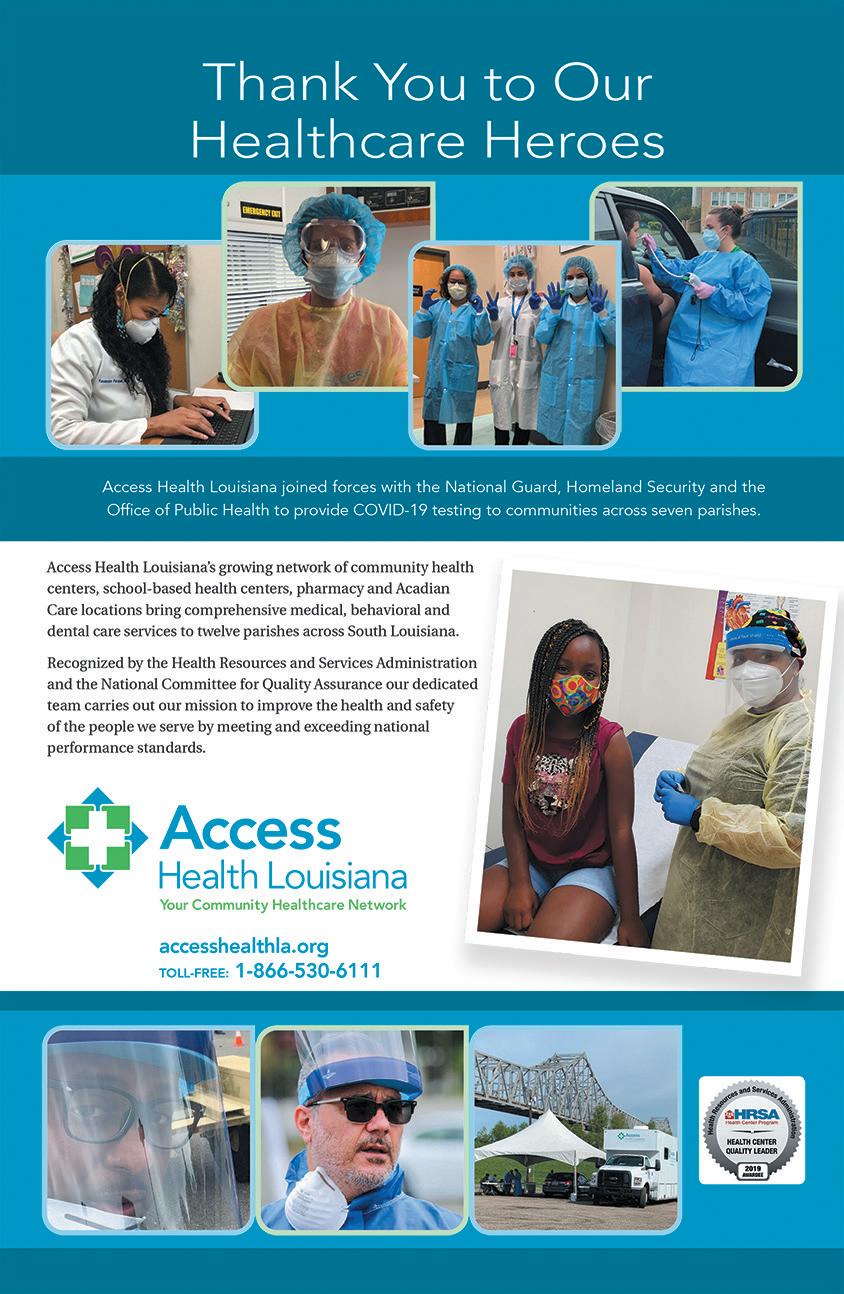
THE HERE AND THE NOW “History of PRIDE in New Orleans Panel” - Lessons Learned
Catherine Roland catherineroland12@gmail.com
We’re hearing so much about history, what’s real, what’s true, what never was true. History is vital in our lives, because our personal history, our experiences, and what we’ve learned through them, help shape our lives going forward. Memories take hold of our brains, our hearts, and often impact the choices we make. There are helpful aspects of having strong memories, which include maintaining your positive self-esteem, constructing a life plan for yourself that includes old friends, family you may love, and space for new friends.
When I prepare each year for Gay Pride, my memories creep up and then burst forth. We tend to cherish the memories of things that have been fun, touching, or have caused us to reflect. All of the things that pop up in my memories about Pride, and especially in New Orleans, were on high alert on Monday, June 29. That was the evening that the panel discussion “History of New Orleans Pride” took place, sponsored jointly by SAGE New Orleans and the LGBTQ Archives Project New Orleans.
When asked to participate, it sounded to me like a fun ‘outing’ during this pandemic, to share and to listen, perhaps see a few faces I hadn’t for months. It didn’t present itself immediately as an incredible learning opportunity, from both an internal and external perspective. But it was!
This panel was a kind of retrospective of gay social activity in New Orleans from the late 1970’s to the present, emphasizing the years from the early ‘80’s to mid-1990’s, a period that covered the worst of the AIDS epidemic. As facilitator Jim Meadows counted the growing number of participants who joined the Zoom meeting, I began to think that people might be really interested in hearing the recollections of the panel members: Valda Lewis, Mark Gonzalez, Michael Hickerson, and myself, introduced by Frank Perez.
I remember, as a young, out lesbian with a job at a Catholic college that mandated discretion around gender identification, having a wonderful time going out, meeting lots of diverse peo

See you soon! Ken & The GrandPre's Team
ple, and being scared every single time I did. For me, that was because I was gay, and I felt like I projected that on sight. I feared for my job, my home, and any personal or professional respect I might have earned up till then. Apparently, though, I didn’t project that. I was often treated as though I was straight on the job, and found myself making friends with a wonderful gay man who worked with me, and with whom I would attend various social functions for the job. His partner and my partner would sometimes spend those evenings together, so it worked very well. Hiding. Denying. And feeling afraid.
Michael Hickerson shared how it was back then to be a Black gay man, and how that could often be disastrous. I’m of the generation who fought hard for racial equality and saw change take place so it wasn’t that I had no awareness. What I didn’t know was that racism was rampant within the gay community here in the late ‘70’s into the ‘80’s, and that this insidiousness caused much anxiety and fear.
Of course, while I could hide my identity as a lesbian, Black people can generally be identified immediately; for gay and lesbian Blacks, the potentially dangerous intersection of race and sexual identity added to their fear and anxiety. Today, it’s often a celebratory discovery to acknowledge the intersectionality of many of us. Back then, however, as I and my fellow panelists recalled, it felt simplistic, linear, and often cold. Times change.
Sadly, some of the same prejudices that were levied at gay and straight women, especially women of color, during the 70’s and 80’s have lived on through the 90’s until right now. Gender inequity/gender bias seem never to have ended, blossoming more at certain points as seen by the bizarre







E X T R A C A S H E A R N Apply Now! Send y If you are our CV to info@ambushpublishing.c looking for additional income, Seeking Self-Starters with Reliable Transportation for Magazine Distribution a Ad Sales om nd
hearing of a potential Supreme Court Justice two years ago.
My memories of Pride gatherings, New Orleans Women Against AIDS, and many fundraisers were always of lesbians who were solid volunteers, creative minds, great supporters of Pride -- but no one knew about them. Gay Pride back then was predominantly run by cisgender gay males, and as I learned recently, has reportedly been that way up until now.
Nationally, women still do not have an amendment to protect them, as we never passed the ERA (Equal Rights Amendment). We may not have addressed that fact during the panel, but memories from that time came up for me. This is 2020, and we still don’t have equal pay for equal work, or secure legislation on a woman’s right to decide about her reproductive rights that doesn’t provoke threats of terror. We may be dangerously close to going backwards.
The most important memories I have, however, revolve around love, both for people actively in my life as well as those that weren’t directly. Caring, compassion, and dedication are things I remember from that time, whether we were raising money for Pride or the NO/AIDS Task Force or Lazarus House, or just having a great time in Washington Park or Armstrong Park.
We pulled together as a group, fought for many things, attended many funerals, and collectively mourned too many dear friends. Those are the threads that tie together my memories of early Pride in New Orleans, of the social justice issues we still fight for, and of the compassion we must continue to muster.
Be careful out there, friends, wear your mask, and practice social distancing. We have to be alive to make needed changes. Protect yourself, and those you love. And know that you are loved!
Dr. Catherine Roland, LPC, is a therapist in private practice, specializing in our LGBTQ+ community for 25 years. Catherine is a member of the Board of Directors of both CrescentCare-NO/AIDS Task Force, and SAGE New Orleans.
PARTY DOWN 2020: The Year of Living Dangerously
Tony Leggio ledgemgp@gmail.com
Pandemics, quarantine, massive unemployment, riots, rampant racism, political divides, murder hornets, cancel culture, Saharan duststorms and f**cking Carole Baskin are just a few of the highlights of 2020 and the hits keep a-coming. Sometimes it’s just too much and you want to lock yourself in your house and hide. I have to admit, it is getting hard for a positive person like me to stay upbeat these days. I mean seriously with everything going on in the world, people are worried about wearing a mask. And they call me a Drama Queen!
Now all of a sudden we have people called Karens (or Chads or Kens or, in my world, Giuseppes - sounds more exotic), who are causing all these disturbances because of entitlement issues, racism and or just plain inconvenience. I feel sorry for the families of these Karen people; can you imagine being trapped in the house with them? I mean when you do something bad at home, who does she call? She is the manager!
I have a theory about Karens; most of them have lived their life escaping reality, relying on someone else to do the heavy-lifting for them such as teachers, parents and/or significant others. Now with COVID, their children are at home full-time, so they have to be engaged with them all the time and many of them or their spouses have lost their job so their income is tight curtailing their lifestyle. And since they do not want to literally kill the babysitter, grandma/grandpa are unable to watch the kids or help out.
There is not enough Xanax in the world to help them with their anxiety, hence they go out in public angry and ready to fight. Because she (or he) knows at home no one cares or will listen to their bull, they have to take it out on others. And here we are today. Oh joy.
How do we combat this tireless brigade of negativity when it is literally all around us from social media to grocery stores? I am not a psychologist nor have any medical experience beyond lusting after Patrick Dempsey from Grey’s Anatomy, but here are a few ways to try to stay positive.
Exercise Get outside and experience nature. You can socially distance as well as boost your immune system. From going to one of our parks to walking in your own neighborhood, just get outside, the fresh air will do you good.
Social Media Get away from it and the news for a little while. I understand, since everyone is under quarantine, the need for human interaction is missed. Trolling everyone (friends and strangers) and getting into arguments several times a day, however, is not healthy for you. I do have to admit watching people slowly unravel on Facebook has been a guilty pleasure. Now I see the appeal of such train wreck TV shows like The Bachelor, The Real Housewives of Anyplace and Southern Charmed (which is especially horrible). There are better things to be looking at.
Volunteer If you are able, there are food banks desperate for help; there’s even one that caters to the LGBT community. This will satisfy your need for human interaction in a safe environment while you do a good deed.
Read Catch up on it. If you are like me, you have a stack of books at home that you have not gotten to yet. My pile has gone down substantially since I’ve been home (and unemployed).
Clean Your House Or do home projects. I Maria Kondo’ed my entire home and redid my fence in the backyard. It felt good to accomplish things that I had put off for way too long.
Call a Friend Or socially-distant visit someone. Now that we have the time, this is a great opportunity to catch up with people. Zoom Zoom!
Get a Hobby Learn to bake, sew, cook, whatever it may be. Now is a chance for you to let your creative being run free. Creativity expands your mind and helps keep the darkness out.
These are just some quick little ideas to keep you moving forward. Depression is real and no amount of medicine, meditation or vodka can totally mask the troubles in the world now. But we can recognize it, understand it, and try not to be swallowed up by it. Until next issue, stay safe and healthy.
SNAP PAPARAZZI Out & About with Amon-Ra
MYSTIC KREWE OF AMON-RA’S JULY 4TH FUNCTION “WIENERS, MEAT AND BUNS” @ THE CORNER POCKET
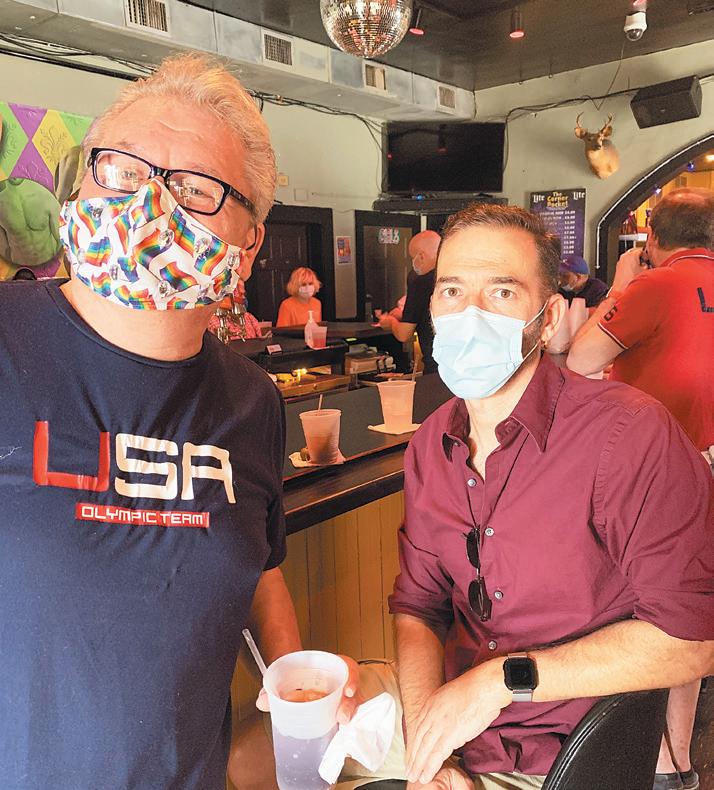
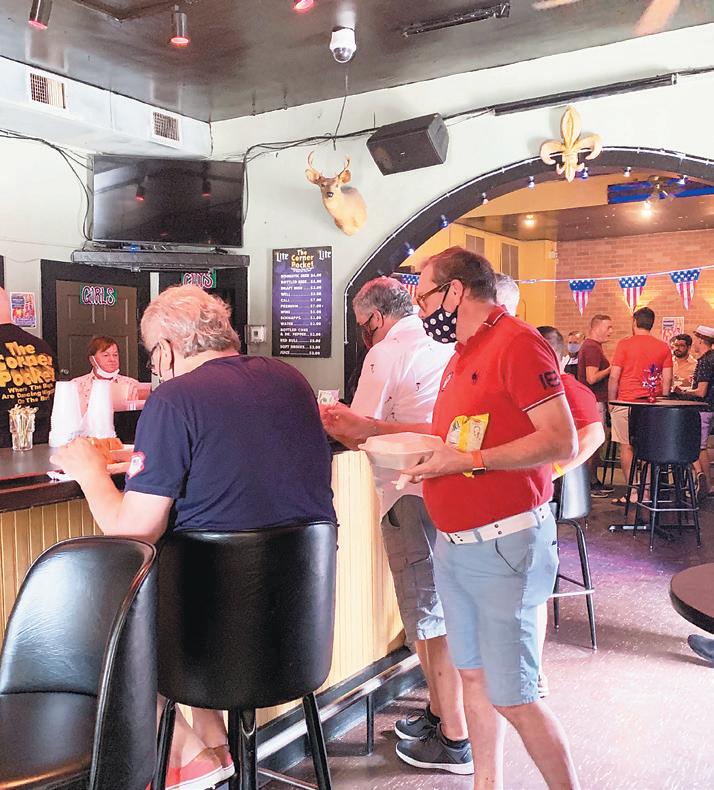

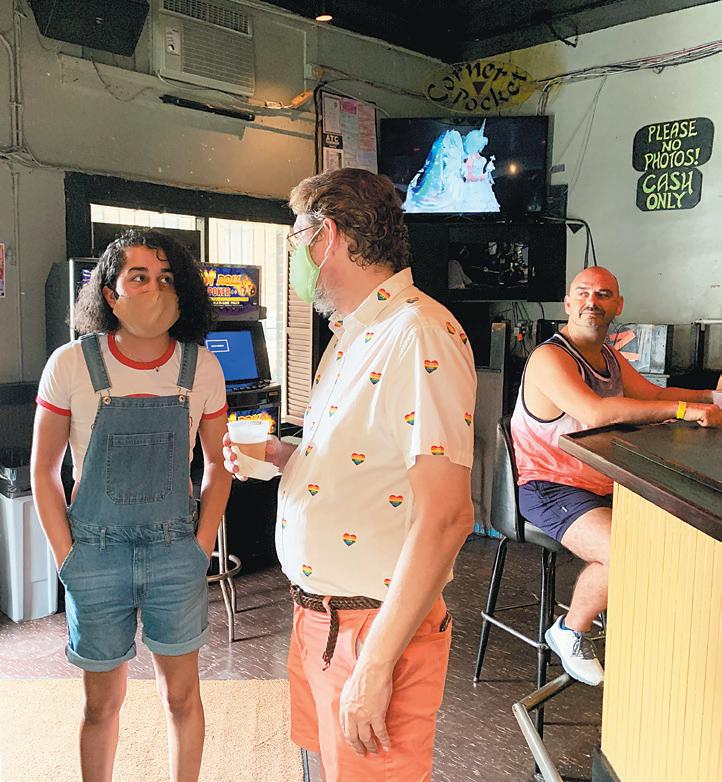
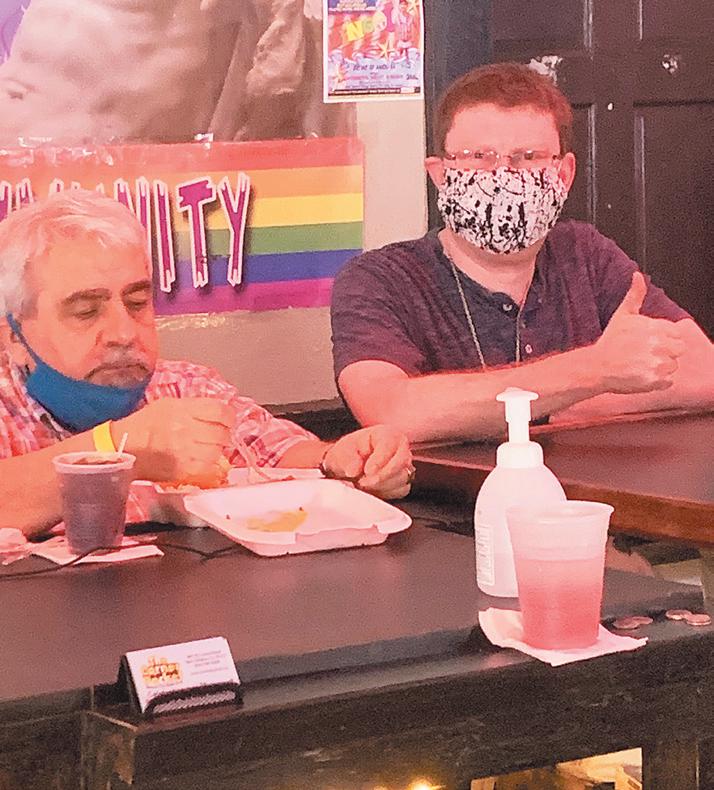
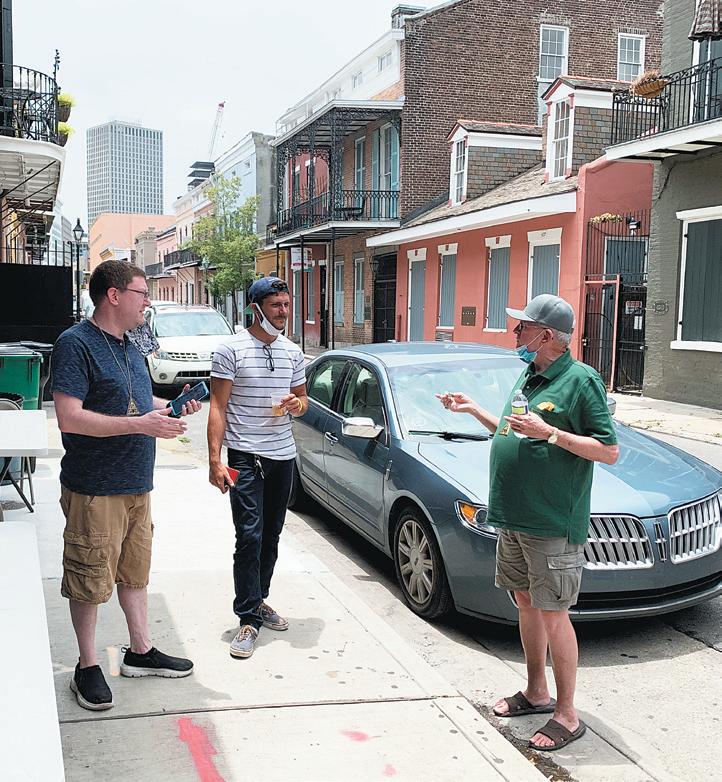

A COMMUNITY WITHIN COMMUNITIES Isolation; powerful estrangement.
The Very Rev. Bill Terry+ Rector St Anna’s Episcopal Church fr.bill@stannanola.org
“A person is a person through other persons; you can’t be human in isolation; you are human only in relationships.” ― Rt. Rev. Desmond Tutu
The city is opening up. Or, so it would seem. Just today bars now have to place tables outside. Last week it was inside social distancing. One of the rants is the very phrase “social distancing.” Such should be “physical distancing” because the former contributes to isolation. Even in our words and phrases this pandemic is an engine that isolates.
Have you seen the strong almost intoxicating desire to rejoin our friends at our local bars, clubs, and shows? Perhaps you have joined such groups. Sometimes it is so hard to define ourselves outside of our environments. I was an only child and for much of that childhood I was pretty good with that. But I do remember clearly one day when I felt so alone. I kept asking my mother to go somewhere. I wanted nothing but her attention. Then she knelt down and said, “Billy, you are going to have to learn to like yourself.” I was in no way satisfied with that odd answer. I guess that I went in my room, gave it some thought then likely played with some green plastic army guys and annihilated them all. Unsatisfactory.
Maybe we can look at what some of the experts say:
Regarding older adults: “ As Americans heed the advice of public health and government officials to remain physically distanced from neighbors, friends, and relatives to fight the coronavirus, another epidemic is exacerbated — social isolation. This can result in loneliness, and the negative consequences can be severe: an increased risk of heart disease, depression, dementia, and even death.” 4/2020 The Commonwealth Fund
Regarding younger adults: “The health risks of infection differ by generation. For many young adults, life lived at a social distance, with a lack of peer support, comes at a high cost to mental health. The Centers for Disease Control and Prevention says nearly half of people between 18 and 29 report feeling symptoms of anxiety or depression. That’s significantly higher than the rate for both their parents and their grandparents. Suicide is the second leading cause of death for people under 35.” NPR 7/4/2020
Regarding faith in isolation: (From only one religious leader, Dennis Sasso, the senior rabbi at Congregation Beth-El Zedeck in Indianapolis) [Rabbi] believes he has two main roles during the COVID-19 crisis: making sure his congregants are cared for emotionally and spiritually, and reminding them to follow health experts’ directives. “As a faith leader, what I can say to the community is, listen to the medical and scientific advice,” says Sasso. “Follow all the protocols. Follow the directives that will keep us healthy. Science and medicine will help us uncover the cure. The purpose of religion and faith is to provide the healing that community and wisdom and tradition can bring.” TIME online, Tara Law April 1, 2020.
It should be noted that much of what young adults had been experiencing before COVID is not dissimilar to what elders experience though for very different reasons.
Oh, how we long to be together. Younger adults have climbed into a cave called social media. It is a cave that separates us, but gives us the illusion of being in contact. So, in-person socialization slowly erodes and with it a sense of place. So, what we find is that the suicide rate for this age group is higher than the national average. Compound that with being a part of the LBGTQ+ identity and the suicide rate skyrockets.
LGBTQ+ elders share a similar fate. Estrangement from families, isolation, and a continuing confrontation with social norms of a decade or more ago.
In fact the issue for older LGBTQ+ persons is so acute that there has been a lot of conversation about establishing a “Gay Retirement Home” because of the predatory, dismissive, and often abusive conditions that LGBTQ+ persons experience in current retirement homes. It is the same old crap of beating up the gay person; it is just the geriatric version of it. This community can give great thanks to SAGE (NOAGE) for attending to the potential isolation of older members of the Community. Yet how many slip through the cracks?
At this point, we bear witness to isolation before COVID. The pandemic has created a whole new era of separation and a social situation where isolation is almost normative. Those who crave being in community attempt, in an almost addictive way, to break out and socialize. I am seeing drag shows with no masks and no distancing. I worry about those tradition-bearers. I
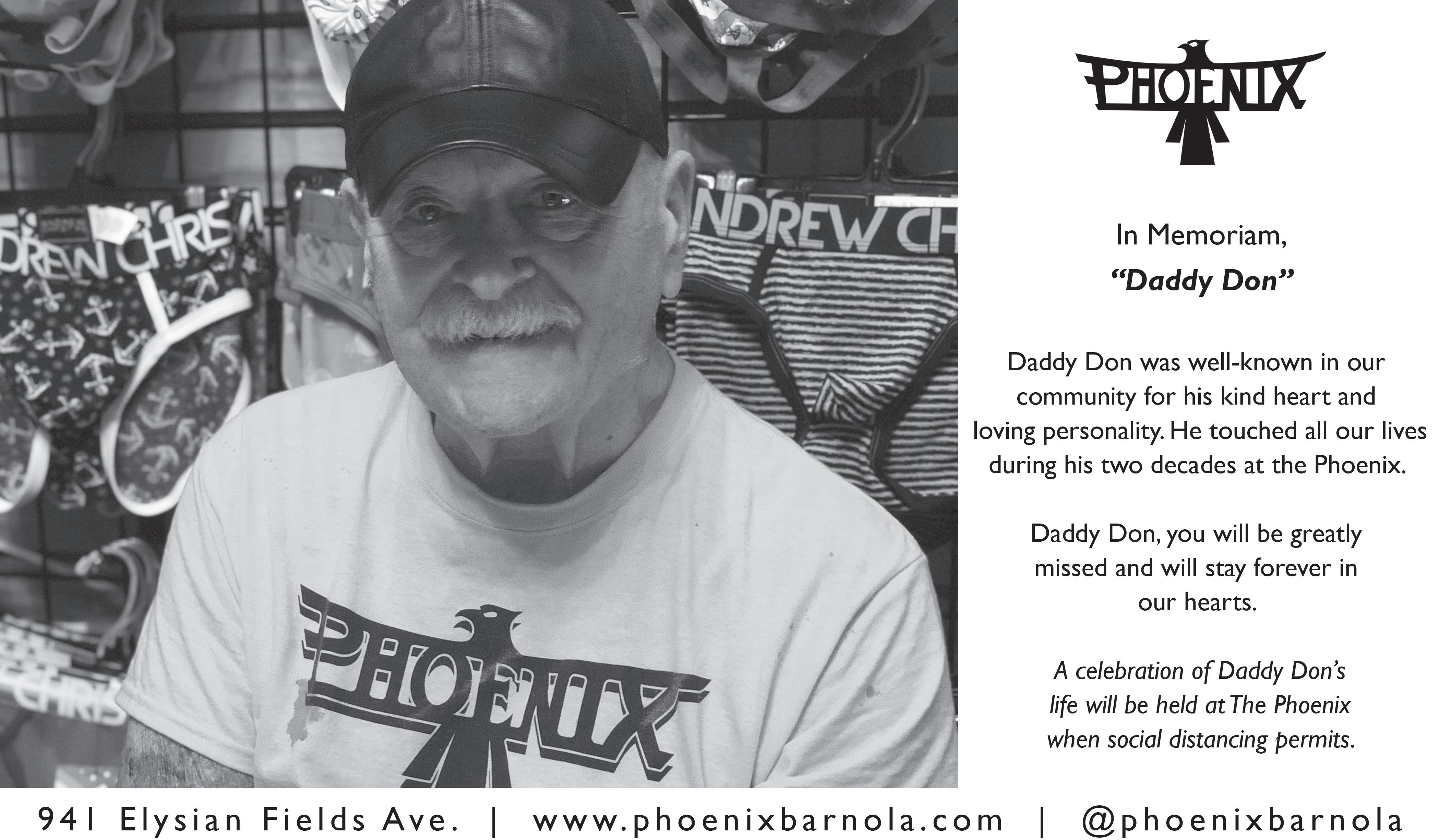
see bars and pubs, generally not in Orleans Parish but beyond our borders, that pack the house. We watch with morbid fascination the crowds in Florida at Spring Break, or perhaps in Missouri, yet the need to go to a watering hole is so intense that many wander that way.
I know it is difficult. I know that businesses and jobs are at risk. I also know that many of our Gay bars have tried wholeheartedly to comply with best practices. This is particularly true of French Quarter bars. Yet, other places seem to ignore social distancing. People in our own community seem to ignore and not model safe behaviors and so....the government steps in. I suppose what this is all about is the ancient adage to “take the log from your own eye.” Some soul searching might be good.
The local bar is a unique institution in the Community. For generations, it was the safe place. It remains the safe place for many. Most of those establishments, the ones that I am familiar with, all help support the larger community even beyond providing a safe gathering space. Look what Betty’s did when we first went into lockdown. Bear witness to the several bars that have supported our community outreach: The Phoenix, Mag’s, Cutter’s, Friendly Bar, Golden Lantern, Bourbon Pub, Oz and the list goes on. So, yes I am a fan, but I am also very worried about the health of the Community.
My Lament
If Christians, specifically churches and denominations, had not demonized ‘homosexuality’. If we/they had embraced the Community and understood how difficult it had been for so many centuries. If somehow the late 20th century had found its way into denominations in the 1950’s instead of almost a half century later. Then isolation, estrangement, and separation would not be quite so chronic nor quite so acute. Humans-- trans, gay, cis gen, fluid, lesbian, and all manner of folk-- would have known of a quiet and safe place where life is valued and human foibles celebrated.
If we can learn to open our doors, our video streams, our hearts, and our minds to really offer radical hospitality then, as the Rabbi said, we might, “ provide the healing that community and wisdom and tradition can bring” We are trying, but are we trying hard enough?
I grieve for young men who live on the street, homeless, in bad shape, gay and afraid. They are learning too soon to be hard and devious (for preservation). They are in a form of isolation.
I grieve for the old person who can no longer voyage out. Who has no family that recognizes them. I grieve as they languish with only Judge Judy and not much else. They are in a form of isolation.
I grieve for the poor souls who are not confident nor self-accepting enough to live a solitary life that does not require adoration, affirmation, and bar-bound companionship in order to avoid depression. They are in a form of isolation.
I and this church cannot reach each and every one of you to tell you constantly that you are beloved beyond measure by a creator that made you. That the church has erred and gone astray from the Rabbi who wandered the Galilee proclaiming release from the bondage of hatred and arrogance. I lament that new voices can only go so far.
If you find that you are in isolation, that you are getting depressed, that you are compelled -- despite the best guidance of a COVID world -- that you NEED to go out and to breach protocols....call a friend. If not a friend, call the church. We are your friend. But please know that all of the time, in all places, in all manners of sober, drunk, high or in-between, you are beloved. God made them. God made them in God’s image. God made them Man and God made them Woman. You are beloved.

COVID-19 and the LGBT+ Archives Project
Frank Perez frankearlperez@gmail.com
The COVID-19 pandemic has affected non-profit organizations across the country and the LGBT+ Archives Project of Louisiana is no exception. In addition to disrupting the Archives Project’s programming schedule for 2020, the shutdown has afforded the Archives Project an opportunity to refocus its overall mission, especially in light of the Black Lives Matter movement. Simultaneously, the pandemic has also enabled the all-volunteer organization to productively continue the ongoing effort to “Get Our History Out of the Closet.”
The most obvious effect of the lockdown for the Archives Project was the loss of its administrative office and exhibit space on St. Ann Street. The exhibit space, which featured a timeline of local queer history as well as vintage photographs from gay Carnival balls and Southern Decadence memorabilia, among other things, was funded primarily through the generous donations of those who visited the space. The loss of that income made keeping the space open unfeasible.
While the Archives Project hopes to eventually reopen another exhibit space, such a space is just the proverbial “tip of the iceberg” of what the Archives Project does. Much of the work involved in preserving history is conducted behind the scenes—locating collections & material and then persuading the owners to donate it to an area museum or archival repository. In the last few months, the Archives Project has been successful in facilitating the donation of two major collections to the Louisiana Research Collection at Tulane University: The organizational records of PFLAG New Orleans (including a complete run of their newsletter, The Banner) and the personal papers of Larry Best, an attorney and long-time activist.
In addition to farming collections to permanent homes, the Archives Project has also kept busy with its oral history initiative. When the pandemic broke out, several previously recorded interviews had yet to be transcribed. Transcription is a painstakingly tedious process but since the city shut down, several have been completed.
Public programming events, of course, have had to be canceled or postponed. The Archives Project annual membership meeting, which usually takes place in June, has been postponed to a date yet to be determined later in the year, and the group’s annual Oracle Gala, at which a person or organization is honored for their donation of material that helps chronicle our history, has been canceled for 2020. Nevertheless, the Archives Project did partner with SAGE New Orleans (formerly NOAGE) to co-sponsor a virtual panel discussion on the History of Pride in New Orleans.
Other programs slated for 2020 have also shifted to online platforms. The Archives Project had planned to participate in an October conference of The National Museum of African American History and Culture (a division of the Smithsonian Museum). The conference was to be held in New Orleans before the pandemic; it has now shifted to an online Community Curation Project. The Archives Project is proud to participate.
The NMAAHC’ Community Curation Project was launched prior to the murder of George Floyd and the rejuvenation of the Black Lives Matter movement makes it even more timely. Regarding BLM, the LGBT+ Archives Project of Louisiana has joined hundreds of institutions around the country in signing the open letter, “LGBTQ Organizations Unite to Combat Racial Violence,” and has issued its own statement condemning the racist murders of George Floyd, Breonna Taylor, Ahmaud Arbery, Rayshard Brooks, Tommie McGlauthen Jr., and far too many others across this nation.
The Archives Project is also in the process of seeking a publisher to commission a book about African American LGBT+ history in New Orleans to be written by a local queer author of color. This effort is in its beginning stages but is critically important. Gaps in the LGBT+ historical record abound and the lack of black primary source material is gaping.
Pandemic or not, the LGBT+ Archives Project of Louisiana remains committed to preserving local queer history. To learn more about the AP’s work, or to donate financially, please visit https://www.lgbtarchiveslouisiana. org/



